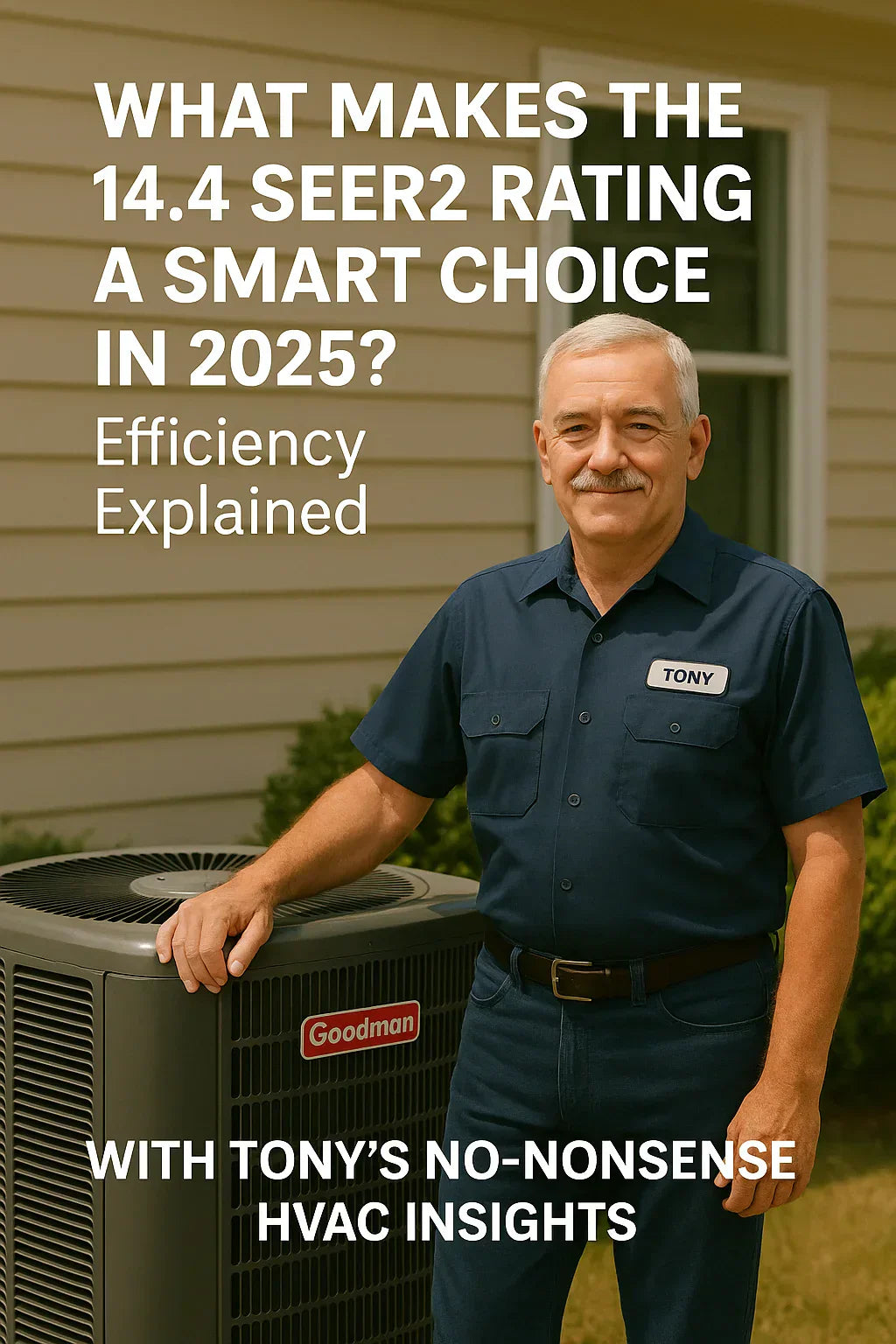Tony here—ready to break down the numbers that actually matter when choosing your next A/C unit. Let’s cut through the buzzwords and get to the truth about SEER2 and why 14.4 might be the sweet spot for your home.
⚖️ What Is SEER2 and Why Should You Care?
SEER2 (Seasonal Energy Efficiency Ratio 2) is the updated standard that replaced the original SEER system in 2023. It reflects real-world performance more accurately by using higher external static pressure (ESP) in its testing procedure—0.5" vs. 0.1".
Why It Matters:
-
More accurate energy usage predictions
-
Greater consistency across manufacturers
-
Improved HVAC system comparisons
Read more: ENERGY STAR on SEER2
🔧 SEER vs. SEER2: What Changed?
| Rating System | Static Pressure | More Realistic? | Typical Range |
|---|---|---|---|
| SEER | 0.1" ESP | ❌ No | 13–21 |
| SEER2 | 0.5" ESP | ✅ Yes | 13.4–21.5 |
Goodman’s GLXS4BA6010 earns a 14.4 SEER2 rating—which translates to roughly 15.5–16.0 SEER under the old system.
💰 Is 14.4 SEER2 Efficient Enough?
In a word: Yes. Here’s why.
1. Meets All 2025 Regional Requirements
-
Southern U.S. minimum = 14.3 SEER2
-
Northern U.S. minimum = 13.4 SEER2
-
14.4 exceeds both, so you’re covered coast to coast
Source: U.S. DOE Efficiency Guidelines
2. Balanced Cost-to-Performance Ratio
14.4 SEER2 systems typically:
-
Cost $400–$1,200 less than high-end 17+ SEER2 units
-
Deliver 80–90% of the energy savings
-
Have fewer components = lower repair risk
3. Ideal for Medium-Large Homes (2,000–3,500 sq ft)
You don’t always need premium SEER2 to cool efficiently.
💡 R-32 Refrigerant = More BTUs per kWh
The Goodman 14.4 SEER2 model uses R-32 refrigerant, which is inherently more efficient than R-410A.
R-32 Efficiency Benefits:
-
10–12% lower energy use vs. R-410A
-
Better heat transfer properties
-
Lower Global Warming Potential (GWP: 675 vs. 2088)
Source: Daikin R-32 Overview
📊 Real-World Savings: What Does 14.4 SEER2 Save You?
Based on U.S. Average Cooling Load:
-
2,800 sq ft home
-
Cooling Season = 1,000 hours/year
-
Utility rate = $0.14/kWh
| Rating | kWh/Season | Cost/Year | Cost over 10 Years |
| 13.4 SEER2 | 4,500 | $630 | $6,300 |
| 14.4 SEER2 | 4,180 | $585 | $5,850 |
| 16.0 SEER2 | 3,750 | $525 | $5,250 |
Savings with 14.4 SEER2: $450 over 10 years
🛠️ Maintenance & Longevity: Why Mid-Tier Often Wins
Pros of 14.4 SEER2 Units:
-
Less complex electronics
-
No variable-speed inverter = easier repair
-
Compatible with standard thermostats
-
Fewer replacement parts = fewer service calls
Learn more: HVAC.com — SEER2 Maintenance Guide
🌱 Eco-Friendly Without Overkill
14.4 SEER2 is often eligible for federal and state rebates, especially when paired with:
-
R-32 refrigerant
-
ENERGY STAR-certified air handlers
Check: DSIRE: Database of Incentives
🤝 Who Is 14.4 SEER2 Perfect For?
-
Tony-style homeowners: practical, reliable, value-driven
-
Homes 2,000–3,500 sq ft
-
Warm-to-hot regions
-
People replacing 10+ year old systems
-
Anyone avoiding overcomplicated upgrades
🔎 Final Takeaway for Tony
14.4 SEER2 hits a Goldilocks zone:
-
Efficient enough to save you real money
-
Simple enough to keep service bills low
-
Modern enough to meet new refrigerant and DOE standards
You don’t have to overspend for a reliable, efficient R-32 system. Goodman’s GLXS4BA6010 has your back—and Tony would approve.
In the next topic we will read about: Understanding R-32: Why Goodman Made the Switch from R-410A







